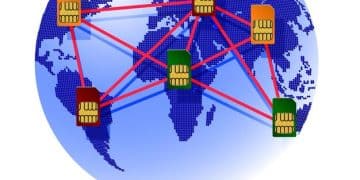Blockchain Beyond Cryptocurrency: Revolutionizing US Supply Chains

Blockchain technology extends far beyond cryptocurrencies, offering transformative solutions for enhancing transparency, efficiency, and security in US supply chains by streamlining processes, reducing fraud, and improving traceability.
The buzz around blockchain beyond cryptocurrency: transforming US supply chains is growing louder every day. While initially known as the backbone of Bitcoin and other digital currencies, this technology is now being recognized for its potential to revolutionize various sectors, especially supply chain management in the United States.
Understanding Blockchain Technology
Before diving into its impact on supply chains, it’s crucial to understand what blockchain technology really is. At its core, a blockchain is a decentralized, distributed, and immutable digital ledger. This means that data is recorded in blocks that are linked together in a chronological chain, making it extremely difficult to alter or tamper with.
Key Features of Blockchain
Blockchain technology offers several key features that make it particularly well-suited for supply chain management. These include transparency, security, and efficiency.
- Transparency: Every transaction on the blockchain is visible to all participants, creating a transparent record of the entire supply chain.
- Security: The decentralized and immutable nature of blockchain makes it highly secure, reducing the risk of fraud and data breaches.
- Efficiency: By automating processes and reducing paperwork, blockchain can significantly improve the efficiency of supply chain operations.
- Immutability: Once data is recorded on the blockchain, it cannot be altered, ensuring the integrity and reliability of the information.
These features enable blockchain to address some of the most pressing challenges facing supply chains today, such as lack of transparency, counterfeiting, and inefficiencies in tracking goods.

Current Challenges in US Supply Chains
US supply chains face a myriad of challenges that impact efficiency, cost, and reliability. From opaque tracking systems to rampant counterfeiting, these issues can disrupt the flow of goods and erode consumer trust.
Lack of Transparency
One of the most significant challenges is the lack of transparency. Often, businesses have limited visibility into the journey of their products, making it difficult to identify bottlenecks, verify authenticity, and ensure ethical sourcing.
Counterfeiting and Fraud
Counterfeiting remains a persistent problem, costing businesses billions of dollars annually. The complex web of global supply chains makes it challenging to prevent counterfeit goods from entering the market.
Blockchain technology offers a promising solution to these challenges by providing a secure, transparent, and immutable record of all transactions and movements within the supply chain. This can help businesses track products from origin to consumer, verify their authenticity, and ensure compliance with regulations.
How Blockchain Enhances Supply Chain Transparency
Transparency is critical for building trust and accountability in supply chains. Blockchain technology enables unprecedented levels of transparency by providing a shared, immutable ledger that all participants can access.
Real-Time Tracking
With blockchain, businesses can track products in real-time, from the moment they leave the factory to when they reach the consumer. This level of visibility enables proactive management of potential disruptions and ensures timely delivery.
Improved Traceability
Blockchain also enhances traceability, allowing businesses to trace the origin of raw materials and components used in their products. This is particularly important for industries where ethical sourcing and sustainability are key considerations.
By providing a transparent and traceable record of the entire supply chain, blockchain helps businesses identify and address issues such as counterfeiting, fraud, and unethical labor practices.
Improving Efficiency with Blockchain
Beyond transparency, blockchain can also significantly improve the efficiency of supply chain operations by automating processes, reducing paperwork, and streamlining communication among stakeholders.
Automated Processes
Blockchain-based smart contracts can automate many of the manual processes involved in supply chain management, such as invoicing, payments, and customs clearance. This reduces the need for intermediaries and accelerates transaction times.
Reduced Paperwork
By digitizing records on the blockchain, businesses can eliminate the need for paper-based documentation, reducing administrative costs and improving data accuracy.
- Streamlined Logistics: Blockchain can streamline logistics by providing a single source of truth for all stakeholders, ensuring that everyone has access to the same information.
- Faster Payments: With blockchain-based payment systems, businesses can make and receive payments quickly and securely, reducing delays and improving cash flow.
- Reduced Errors: By automating processes and eliminating paperwork, blockchain can reduce the risk of human error, improving the overall efficiency of supply chain operations.
These improvements can lead to significant cost savings and enhanced competitiveness for businesses operating in the US market.

Use Cases of Blockchain in US Supply Chains
Several industries in the US are already exploring and implementing blockchain solutions to address specific supply chain challenges. From food and agriculture to pharmaceuticals, the potential applications are vast.
Food and Agriculture
In the food and agriculture industry, blockchain can be used to track products from farm to table, ensuring food safety and preventing contamination. This also helps consumers verify the origin and authenticity of the food they consume.
Pharmaceuticals
The pharmaceutical industry faces significant challenges related to counterfeiting and drug diversion. Blockchain can provide a secure and transparent record of the supply chain, helping to prevent counterfeit drugs from reaching consumers.
These are just a few examples of how blockchain is being used to transform supply chains in the US. As the technology matures and adoption increases, we can expect to see even more innovative applications emerge.
Challenges and Opportunities for Blockchain Adoption
While blockchain offers significant potential for transforming US supply chains, there are also challenges that need to be addressed to ensure successful adoption. These include regulatory uncertainty, scalability issues, and interoperability concerns.
Regulatory Uncertainty
The lack of clear regulatory frameworks for blockchain technology creates uncertainty for businesses looking to implement blockchain solutions. Governments and regulatory bodies need to provide guidance and clarity to foster innovation and adoption.
Scalability Issues
Blockchain networks can face scalability issues when processing large volumes of transactions. Addressing these issues is crucial for ensuring that blockchain solutions can handle the demands of complex supply chains.
- Interoperability Concerns: Different blockchain platforms may not be compatible with each other, creating challenges for businesses that need to integrate data from multiple sources.
- Data Security and Privacy: Ensuring the security and privacy of data stored on the blockchain is essential for building trust and confidence in the technology.
- Education and Awareness: Many businesses are still unaware of the potential benefits of blockchain technology, highlighting the need for education and awareness initiatives.
Despite these challenges, the opportunities for blockchain adoption in US supply chains are immense. By addressing these issues and working together, businesses, governments, and technology providers can unlock the full potential of blockchain to create more efficient, transparent, and secure supply chains.
| Key Point | Brief Description |
|---|---|
| 🚀 Enhanced Transparency | Blockchain provides a transparent view of the entire supply chain. |
| 🔒 Improved Security | Immutable ledgers reduce fraud and data breaches. |
| ⏱️ Increased Efficiency | Automation and reduced paperwork streamline operations. |
| 🌱 Ethical Sourcing | Traceability ensures products are ethically sourced. |
Frequently Asked Questions
▼
Blockchain is a decentralized, distributed, and immutable digital ledger used to record transactions across many computers, making it difficult to alter the records without consensus of the network.
▼
Blockchain provides a shared, immutable ledger that all participants can access, allowing real-time tracking of products and traceability of raw materials, fostering transparency throughout the supply chain.
▼
Key benefits include enhanced transparency, improved security, increased efficiency through automation, reduced paperwork, and better traceability for ethical sourcing and compliance.
▼
Challenges include regulatory uncertainty, scalability issues, interoperability concerns between different blockchain platforms, and the need for increased education and awareness about blockchain’s potential.
▼
Industries such as food and agriculture, pharmaceuticals, and luxury goods can greatly benefit by using blockchain to ensure product safety, prevent counterfeiting, and verify the origin and authenticity of goods.
Conclusion
In conclusion, blockchain beyond cryptocurrency: transforming US supply chains offers a wealth of opportunities for businesses to enhance transparency, improve efficiency, and strengthen security. While challenges remain, the potential benefits are undeniable, positioning blockchain as a key enabler of next-generation supply chain management in the United States.





